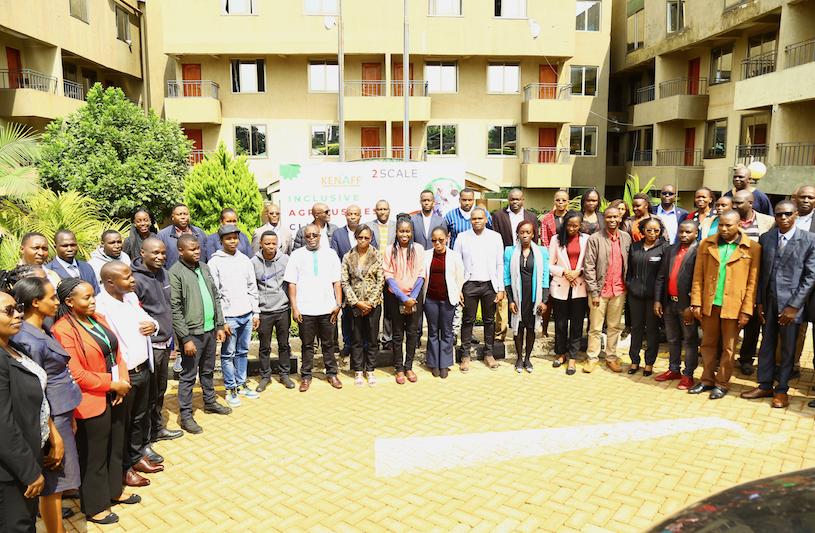
The agriculture and food sector is the bedrock of global food and nutrition security, providing livelihoods for many and foster prosperity in rural areas.
In an effort to improve the country’s food production and security as well as farmer’s incomes, the Kenya National Farmers Federation – KENAFF in collaboration with the 2SCALE project funded by SNV formed the inclusive agribusiness club. The club’s objective is to create a symbiotic working relationship with all stakeholders in the agricultural sector. Speaking recently during the clubs sharing and learning event held at KENAFF headquarters in Thogoto Kiambu county, the federations CEO Daniel M’Mailutha said that “there is a huge disconnect between the national and county governments roles when it comes to agriculture adding that the same goes for the private sector, civil society and development organizations in the sector who have been working in ‘silos’ inhibiting swift development”. “There is need for all these organizations to talk to each other and see how and where best to add value and apply resources to avoid duplication of efforts and applying resources sub optimally. Such collaborations will not only hasten the achievement of the sustainable development goals 1 and 2 on no hunger but also provide a network for networking and learning,” he added.
The inaugural inclusive agribusiness club – IAC was held in August 29th 2023 and brought together different stakeholders whose interventions were geared towards inclusivity.
During the past six months the two organizations have been distilling the issues that came from the launch and looking to bring a more focused group to discuss how to catalyze the club.
According to Daniel, “the sharing and learning event is meant to have this smaller group look at the next steps, where do we go from here, what should we be looking at and who should constitute the club and how do we communicate with the three sectors i.e., the public, private and civil society.”
Patrick Boro, the country team leader for the 2SCALE program echoed the same sentiments adding that “bringing together these different stakeholders in the sector will help in creating a platform for knowledge sharing to accelerate inclusivity in the agribusiness space mainly looking at how to create equality and involvement in the value chain from the small holder farmers to the base of pyramid consumers and businesses that are in hardships areas, those run by women and youth for economic benefit”.
According to one of the members of the IAC Monica Githiga from Technoserve, “their participation in the club is vital because they have been working with low income consumers especially women who will now be incorporated in the value chain as suppliers of raw materials to food processing companies producing products for low income markets”.
Inclusive agribusiness focuses on reshaping core business processes to tackle existing challenges. It leverages collective action, knowledge sharing, and innovative solutions to ensure all participants in agricultural value chains, including smallholder farmers, women, youth, micro-entrepreneurs, and base-of-pyramid consumers, benefit equitably from agricultural development. The goal is to share risks, resources, and rewards among stakeholders, creating value propositions for all involved.